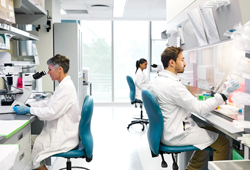Key Takeaways from Goodwin + KPMG @ JPMorgan Symposium: Trends in Biopharma
 On Wednesday, January 15, 2020, during the J.P. Morgan Healthcare conference, Goodwin and KPMG held their initial all-day Symposium at the St. Regis hotel in San Francisco. The Symposium was composed of five separate “bursts” entitled (i) New Frontiers in Digital Diagnostics and MedTech, (ii) Europe Unleashed, (iii) Knowing the Best IPO Strategy, (iv) Trends in Biopharma and (v) Mergers and Acquisitions. Stéphane Bancel, the Chief Executive Officer of Moderna Therapeutics, provided the keynote address.
On Wednesday, January 15, 2020, during the J.P. Morgan Healthcare conference, Goodwin and KPMG held their initial all-day Symposium at the St. Regis hotel in San Francisco. The Symposium was composed of five separate “bursts” entitled (i) New Frontiers in Digital Diagnostics and MedTech, (ii) Europe Unleashed, (iii) Knowing the Best IPO Strategy, (iv) Trends in Biopharma and (v) Mergers and Acquisitions. Stéphane Bancel, the Chief Executive Officer of Moderna Therapeutics, provided the keynote address.
Burst Four consisted of a panel entitled “Evaluating and Partnering New Technologies and Emerging Business Models.” This panel was moderated by Kingsley Taft from Goodwin, Jeffrey Stoll from KPMG and Nicholas Pullen from Bristol-Myers Squibb. In this panel, participants provided their insights regarding active deal sectors in biotech and issues to consider with respect to deal structure.
Key takeaways from Burst Four were as follows:
- Platform technology deals in areas involving gene therapy, mRNA and immuo-oncology have been active, but some concern persists that companies in certain areas are over-valued, potentially decreasing the overall number of deals that have been made. Although many areas of biotech have actively been generating deals, the number large deals announced in the run-up to JP Morgan appeared to be less than in the prior year. The panelists suggested that the decreased number of deals may be a function of the high valuations that have been placed on biotech companies, noting the premium acquisition price that Roche paid for Spark as an example.
- Given the complexities associated with certain platform technologies, such as gene therapy, many pharma partners prefer partnering deals as opposed to outright acquisitions for platform companies. Panelists suggested that pharma companies are more likely to favor a partnership structure over an acquisition structure when it comes to early-stage platform technologies in biotechnology. The reason for this is that the platform technology is likely to need a great deal of additional investment in numerous areas, including manufacturing, before the emergence of a product candidate that the pharma company is willing to develop on its own. In addition, it is very difficult for a pharma company to put a valuation on an early-platform company, but things become easier when the platform actually starts to generate potentially marketable products.